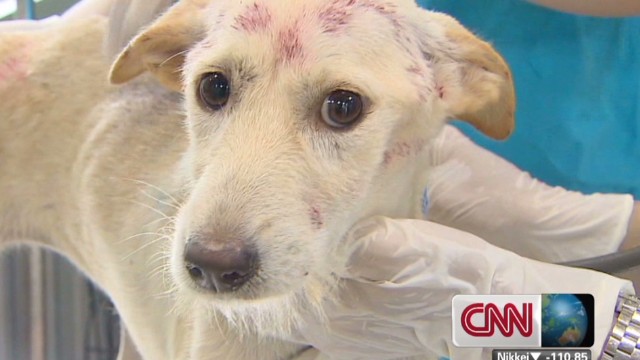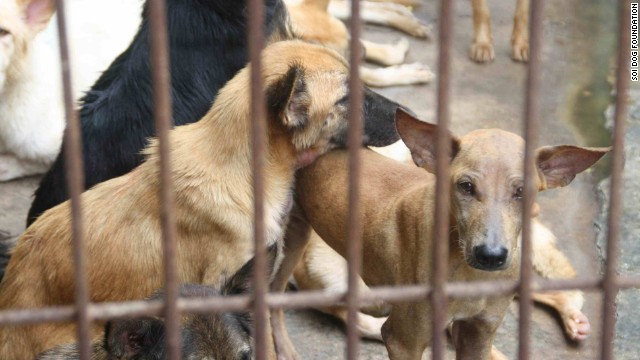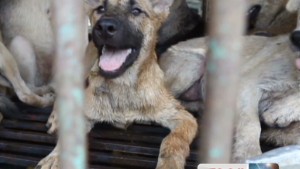Sanctuary at front line of fight against 'inhumane' dog trade
June 6, 2013 -- Updated 1402 GMT (2202 HKT)

Dog smuggling in Thailand
But it's not humidity that hits me as I climb out of the 4WD, rather the overwhelming smell of dog urine and feces.
This is a makeshift
shelter that should be housing a maximum of 400 dogs. Instead there are
more than 1,700 animals being kept in large concrete pens at the
compound. Staff work around the clock.
This region is the
heartland for the cruel and inhumane dog smuggling trade. The illegal
operation sees an estimated 200,000 dogs transported in trucks from
Thailand into neighboring Laos, across the Mekong River and driven
across to Vietnam where the meat is considered a delicacy. Some believe
it has medicinal qualities and acts as an aphrodisiac -- black dogs are
apparently the best for sexual dysfunction. Yet no scientific proof has
ever proved such a claim.
 Images: Keeping dogs from dinner plate
Images: Keeping dogs from dinner plate
 Dogs slaughtered for meat in Vietnam
Dogs slaughtered for meat in Vietnam
The dogs at this shelter
were intercepted more than a month ago after Thai authorities stopped
several trucks trying to cross the border into Laos. The drivers were
arrested but no one was prosecuted. Their cargo? Thousands of dogs
crammed into small steel cages -- at least a dozen dogs to a cage --
where they are left for days on end without food or water, while the
smugglers make their week-long journey.
Some of the dogs die from
suffocation along the way. Others endure broken bones and crushed
skulls during the trip. And they're all disease ridden. These dogs were
destined for restaurants in Vietnam where a single dog can be sold on
average for $60 an animal. It's a lucrative business for smugglers,
considering a dog fetches only a few dollars in Thailand.
John Dalley, founder of the Phuket-based Soi Dog Foundation,
moved to Thailand from the UK 10 years ago on a mission to help the
country's overwhelming stray dog population. The charity, which relies
on donations from animal-lovers around the world, set up an immunization
program, and just last week neutered its 50,000th dog. There are now
plans to expand the program nationwide.
Dalley says the dogs would have endured an even more horrific ordeal if the truck hadn't been intercepted.
"At best, they could
have been clubbed -- maybe unconscious, maybe not -- and had their
throats slit in from of other dogs and they all know what's going on. At
worst, they're skinned alive, strung up and beaten ... while alive, set
on fire," he said. "It's a horrendous death and that's what we're
trying to stop. Never mind that it's illegal to do it -- it's the sheer
inhumanity of this trade that this can still be going on in the 21st
century."
This place should just be for dogs coming in, to get vaccinated and
then to leave and move on to other shelters. But they're all full, if
not overflowing, and these dogs desperately need loving homes.
John Dalley, Soi Dog Foundation
John Dalley, Soi Dog Foundation
While these dogs didn't
end up on dinner plates in Vietnam, they were struck by disease that
spread like wildfire through the shelter due to the overcrowding.
"This place should just
be for dogs coming in, to get vaccinated and then to leave and move on
to other shelters. But they're all full, if not overflowing, and these
dogs desperately need loving homes," he said.
The few that are cute,
fluffy or pedigrees are swiftly adopted but the majority -- mangy strays
and street dogs -- will never leave the concrete floors and wire
fencing of the shelter.
Chusak Pongpanit, chief
of the Animal Quarantine Station, also knows the challenges in front of
him. "We still need a lot of funds because we will have to take care of
these dogs for a long time before they can find homes -- if they find
homes."
Meters away from the pens that divide the sick dogs and the healthy is a building that houses the critically ill.
Skin hangs from their
frail, skeletal bodies. Many are covered in sores, while others have
mucus dangling from their noses -- often a sign of pneumonia, distemper
or canine parvovirus infection.
Last month, disease
claimed 780 dogs. While we watch the veterinarians try to minimize pain
and suffering, a dog takes its final breath and passes away on a
stainless steel trolley.
Marisa Goudie is one of
several vets from the UK who have flown to Thailand, volunteering their
time to help local staff try to stop the outbreak.
The Soi Dog Foundation
that supports the shelter with food, drugs and vaccinations put out an
SOS last month and the Worldwide Veterinary Service, Animals Asia and
the Humane Society International -- organizations based in the United
States, Britain and the Philippines -- answered the call for help.
"It's heartbreaking
being here. These dogs are inherently still wanting to trust humans
after everything they've been through," said Goudie, as she pulled her
stethoscope away from the bony ribcage of the dead dog.
It's heartbreaking being here. These dogs are inherently still wanting to trust humans after everything they've been through.
Marisa Goudie, British Vet
Marisa Goudie, British Vet
The challenge facing
western veterinarian staff that have flown into assist is the Buddhist
religious beliefs of the Thais that don't allow dogs to be euthanized.
"We do have our hands tied because of religious issues and that's
something that internally we're conflicted with -- but we need to
respect their views," Goudie explained.
Hayley Walters is a
veterinarian nurse based in Edinburgh, Scotland and arrived at the
shelter just a few days ago. Not being able to put a dog out of its
misery goes against every bone in her body.
"It's heartbreaking
because in the western world we would help them on their way. But here
we can only give palliative care -- make them as comfortable as
possible. We give them pain relief, with the really skinny ones we give
them some cardboard to sleep on and some kind words. But that's the
saddest thing -- we can't send them on their way."
As for the relatively
healthy ones, she can only try and remain optimistic that the rescue of
these dogs means they have another chance at life.
"What they need is good
treatment, good nutrition and loving homes to go to. This must not be
the end place for any rescue dog. A shelter should not be the end place.
It's a huge problem. if we could stop the root of the problem, which is
the dog eating trade, we could stop this -- all of this."
But for now the
multi-million dollar dog meat industry continues to thrive in parts of
Asia, a harsh reality for animals affectionately referred to as "man's
best friend."

ไม่มีความคิดเห็น:
แสดงความคิดเห็น